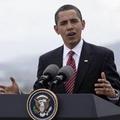This week, a new start for relations between Cuba and the United States and efforts to make the world's cultural heritage available online through the World Digital Library. The fifth Summit of the Americas, held in Trinidad and Tobago April 17th through the 19th, provided a significant moment for President Obama to “seek a new beginning with Cuba.” Although Cuba was not on the summit agenda, nor were Cuban representatives invited to attend the gathering of 34 democratically elected leaders in Port of Spain, relations with Cuba were nevertheless a major topic.
In his opening remarks on April 17th, Obama acknowledged openly the discussions surrounding the relationship between the United States and Cuba. He stated that the United States seeks a new beginning with Cuba, providing the clearest signal yet to leaders and to the Cuban people that U.S. foreign policy is changing toward the island nation.
The president said his administration is prepared to engage with the Cuban government on a range of issues, from drug trafficking, migration and economic issues to human rights, free speech and democratic reforms. But Obama also said he is not interested in talking just for the sake of talking.
The warming of relations began April 13 when White House officials announced an easing of U.S. restrictions toward travel and money transfers by Cuban Americans to family in Cuba. Cuban Americans may also send other items, such as clothes, personal hygiene items, seeds, fishing gear and other personal necessities to family members. U.S. businesses will be able to obtain export licenses to sell cellular telephones, television services and computers to Cubans, and to permit family members in the United States to pay for them, the White House said.
The announcement came four days before the Summit of the Americas was set to begin. For the first time, a White House official also repeated the announcement in Spanish. White House officials said the announcement was intended to reach out directly to the Cuban people.
On April 16, Cuban President Raúl Castro responded, saying that Cuba's government was willing to discuss everything at issue — including human rights, freedom of the press and political prisoners. José Miguel Insulza, secretary-general of the Organization of American States (OAS), announced April 17 that he would call for readmitting Cuba to the OAS. Cuba was barred from membership in 1962. The United States broke diplomatic relations with the Castro regime in 1961 and imposed a trade embargo in 1962. A year later, travel to Cuba by U.S. citizens was banned by then-President John Kennedy.
Secretary of State Hillary Rodham Clinton said in a press conference with Haitian President René Préval in Port-au-Prince April 16 that Cuba's willingness to discuss all of the political, economic and social justice issues confronting the two nations was welcome. She added that her actions and those of the president in the last several months clearly indicate a genuine desire to pursue a new path with the Cuban regime.

